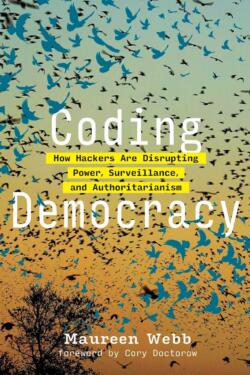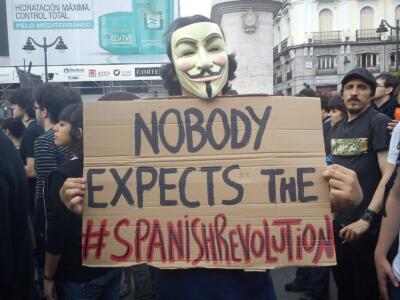1341 An unsafe online world
Coding Democracy: How Hackers are Disrupting Power, Surveillance, and Authoritarianism
by Maureen Webb, with a foreword by Cory Doctorow
Toronto: Penguin Random House Canada (The MIT Press), 2021
$23.95 / 9780262542289
Reviewed by Ron Verzuh
*

An Unsafe Online World: What happens if do-evil computer nerds overrun do-good ones in the struggle to save democracy?
News Flash: Julian Assange, hacker extraordinaire, founder of Wikileaks, and a flawed hero of the Cyberwars, can be extradited to the U.S. to face espionage charges.
I got hacked three months ago. Boom! Everything on my email account vanished. Freak out? You bet. As a writer, email is my lifeline. So I’ve had some experience with the invisible netherworld Maureen Webb thoroughly researched in her book about hackers.
What I found there gave me a new insight into the creeps who invaded my privacy, but it also pushed me to think of how well-meaning, passionate hackers (or “cypherpunks”) — people like Julian Assange and Edward Snowden — are fighting to save “digital democracy.”

As I read Webb’s account of how the Internet and World Wide Web began and how hackers — anyone who can write code online — have so much knowledge and power to disrupt those essential communications systems, it was scary. Was it any scarier than the invisible powers in Washington or London or Berlin?
It was also fascinating to follow Webb from secretive encounter to hidden conference of men and women who built the Web to do good, but found it got corrupted by the profiteers (Apple, Google, Microsoft, Twitter, Facebook). You could divide that world into the hackers who want an open information society and the hackers who want to become millionaires.
To appreciate this book, I had to put away my paranoia long enough to make the distinction. It seemed inevitable that the do-good coders were doomed. The inventors of profit online were in for as much as they could make. They don’t care about democracy or freedom of information or whether I get hacked.

As Webb put it, Facebook and others are designed to monopolize and monetize user information. “Data extraction is part of the business model of every capitalist platform.” She adds that “Calls for platforms like Facebook to respect users’ privacy miss the point that getting around privacy is at the core of the business model.”
Researching her book took Webb around the Cyberworld. Through her, we visit Berlin’s Chaos Computer Club in the heart of “hacker culture.” Move on to Occupy and the battles to rescue “popular sovereignty.” From there, Webb travels to Spain to meet the Indignados (“indignant citizens”) who have risen up against elite forces, including left-wing political parties. In Italy, we meet Cinque Stelle, an “anti-party” citizen’s movement.
Hacking is part of their arsenal for fighting for democracy.
Webb sees these hackers as the vanguard of the fight against anti-democratic power brokers. They are engaged in “direct democracy.” That’s nothing new, she explains, but the difference today is in “What can be achieved to upgrade the quality of Western liberal democracies . . . employing digital tech, networks, and a hacking ethic.”
At each stop on her cyber worldwide tour, we learn the history of hacking and meet the main players. Assange and Snowden are among them, but the list of players flying below the radar is extensive. We also get a short history lesson, linking the hacking phenomenon to events like the Spanish Civil War, the Cuban Revolution, the life of American abolitionist slave Frederick Douglass, the science fiction of Canadian William Gibson, and even the music culture surrounding the Grateful Dead.

Webb walks us through the break-up of massive American companies (“trusts”) like Standard Oil, thanks to Theodore Roosevelt. Then she explains how Europe is pursuing “trust busts” of “digital Goliaths.” Google is the prime example at the moment. Webb again:
The civics lesson in the new trust-busting wars is that digital capitalism, as it is currently practiced, does not serve the commonwealth . . . Left unchecked, it will continue to generate monopolies, gross inequality, and economies that do not work for the majority of people. As any student of history knows, this is a dangerous prospect for democracy.
With this book, Webb joins a long chorus of sources challenging us to get serious about shifting democracy to a new model that better serves all the people. There are Marxist elements of her exhaustive analysis, but she does not accept that solutions will grow from a conventional left-right approach. The world of hackers may have begun with the anarchistic counterculture of the 1960s, but it has embraced a new ethos.

She describes “Privacy for the Weak, Transparency for the Powerful” as a hacker manifesto for the 21st century. Not exactly “Workers of the World Unite,” but the intent is similar. “If privacy and transparency are the minimal conditions people need for maintaining a functioning democracy,” she writes, hackers are the ones to provide them.
Some farmers have taken it seriously. With farm machinery, computer-run like everything else, manufacturers force users to employ only the company’s repair services. They are not allowed to fix the machine themselves. To hell with that, said farmers, and they developed their own tools, a Free Farm Manifesto, and a “co-operative platform to free themselves from the economic oppression of digital monopolies.”
Other examples appear throughout this hopeful but sometimes overwhelming study of what undoubtedly will be an influential part of how we live, who controls us and how we decide our future or have it decided for us.
*
Back to my email getting invaded, I was still digging my way out two months later. But what could I really do? I don’t have a clue what happens behind the screen when I open a website or send an email or a text. After reading Webb’s book, I realize I am totally at the mercy of the bad hackers. So are the people on my stolen contacts list. Of course, that is what the hacker wanted.

A few weeks passed, then the messages surfaced about someone using my email address to ask my friends to go to a Facebook page where they could send money to help a friend. Supposedly the messages were from me. Why wouldn’t they trust it? Most people realized it was a scam. The police didn’t care. There was really nothing they could do.
The fact is, and Webb lays it out methodically, Cyberspace is filled with anonymous invisible forces that can either help people or hurt them. She’s optimistic in thinking on the side of good rather than evil. I worry that the big money may be too attractive for hackers to resist. Think Trump 2024 and the damage he could do if he had all these brilliant cypherpunks on his payroll. Maybe they’re already there. Terrifying.
*

Ron Verzuh is a Canadian writer, historian, and documentary filmmaker. His work has appeared in The Ormsby Review since it was founded in 2016. He lives in Victoria. Editor’s note: Ron’s book Smelter Wars: A Rebellious Red Trade Union Fights for Its Life in Wartime Western Canada will be published soon by University of Toronto Press. See here for Ron’s essay in The Ormsby Review on Trade Unionist Harvey Murphy and here for Mike Sasges’ review of Ron’s Codename Project 9: How a Small British Columbia City Helped Create the Atomic Bomb. Ron Verzuh has recently reviewed books by David Lester, Geoff Mynett, Bonnie Henry, Bonnie Henry & Lynn Henry, Tim Cook, Greg Nesteroff & Eric Brighton, Nick Russell, and Jim Christy.
*

The Ormsby Review. More Books. More Reviews. More Often.
Publisher and Editor: Richard Mackie
The Ormsby Review is a journal service for in-depth coverage of BC books and authors in all fields and genres. The Advisory Board consists of Jean Barman, Wade Davis, Robin Fisher, Cole Harris, Hugh Johnston, Kathy Mezei, Patricia Roy, Maria Tippett, and Graeme Wynn. Scholarly Patron: SFU Graduate Liberal Studies. Honorary Patron: Yosef Wosk. Provincial Government Patron since September 2018: Creative BC
“Only connect.” – E.M. Forster
3 comments on “1341 An unsafe online world”